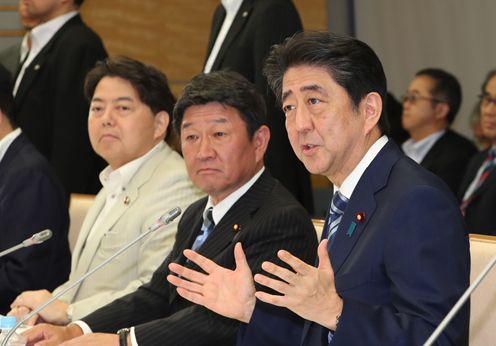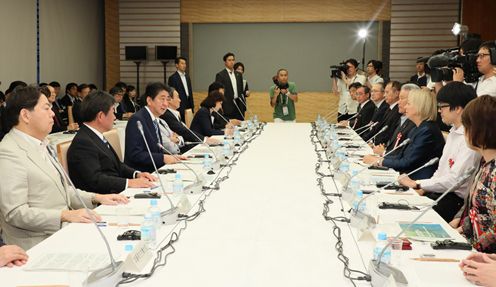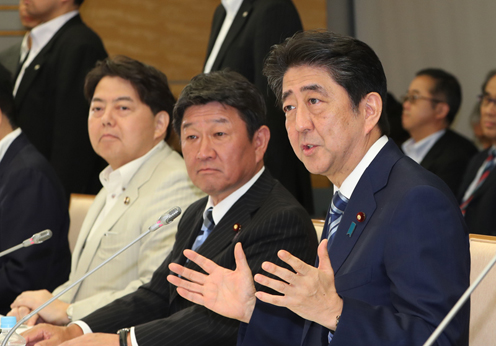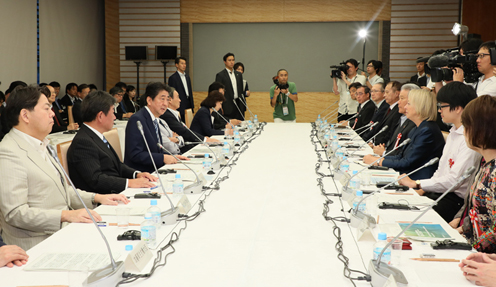Home > News > The Prime Minister in Action > September 2017 > Council for Designing 100-Year Life Society
The Prime Minister in Action
Council for Designing 100-Year Life Society
September 11, 2017

Photograph of the Prime Minister making a statement (1)

Photograph of the Prime Minister making a statement (2)
On September 11, 2017, Prime Minister Shinzo Abe held the first meeting of the Council for Designing 100-Year Life Society at the Prime Minister’s Office.
At the meeting, debate took place on the way forward for the Council.
Based on the discussion, the Prime Minister said,
“Today we begin the Council for Designing 100-Year Life Society.
Human resources development (“Hito-zukuri”) in the lead-up to the 100-year life society is the focus of the Abe Cabinet’s efforts to create a society in which all citizens are dynamically engaged. Together with the productivity revolution, this is one of the major themes for my administration.
Today we are joined by Ms. Lynda Gratton. She has come to Japan all the way from London just to attend this meeting and I would like to express my gratitude for that. In addition, I think that there was a substantial discussion from the experts here, even though this was your first meeting. I think that we have had an extremely meaningful exchange of opinions.
Like Deputy Prime Minister Aso, my remarks will differ significantly from the speech outline that had been prepared, but in any case, the Japanese population will continue to decline. On the other hand, the baby boomer generation will steadily grow older. This paints a somewhat gloomy picture, but if we thoroughly address this situation, we can change the future.
I believe a variety of opinions were offered. There was discussion about improving each individual’s abilities and responding to people’s desire to learn and work. Other comments noted that the elderly have much experience, and that it may be possible to create new initiatives that utilize those experiences. Others stated that people would be able to contribute to society and live their 100-year lives more fully by continuing their education and embarking on new lifestyles.
Being 70 years old today is like reaching one’s 60s or 50s in the past. I myself will turn 63 this year, but I still feel like I am 52 or 53. As Ms. Gratton pointed out earlier, the German Chancellor Konrad Adenauer, who put Germany on the path to recovery after it lost World War II, became Chancellor when he was 74, continued in the job until 88, and then passed away one year later. To avoid any misunderstanding, I have absolutely no intention of continuing on in this job for that long, but what I am trying to say is that if everyone around the world is able to make full use of their abilities then the world will become a more fulfilling place and everyone will be able to lead more fulfilling lives.
For the sake of future discussion, I would like to summarize the key points.
The first point is about securing the opportunity for everyone to receive a university education. We heard opinions stating that we need to create an environment in which young people with ambition can focus on their studies even if they are not blessed financially, and also that we should consider enhancing and strengthening measures such as fund-type scholarships or tuition exemptions in order to reduce the financial burden of an education. I would like to move the discussion in that direction.
Second, there were comments from many Council members on the importance of university reform. In order to create an environment in which people can continue their education no matter their age, we need to find a way to cater to the various needs of working professionals, and we must accelerate the fostering of IT professionals. While taking care to balance the pursuit of scholarship with a practical education, we must work to enhance practical vocational education. At the same time, I would like you to discuss the diversification of personnel hiring practices by the business community in order to open up career paths for those receiving recurrent education.
Third, there is the matter of reforms toward the creation of social security for people across all generations. We heard the opinion that we should enhance social support for younger generations. I think that we need to make thorough progress on eliminating childcare waiting lists, the acceleration of efforts to make early childhood education at kindergartens and daycares free, and measures to secure the necessary caregiving personnel for reducing the number of people who leave employment to provide nursing care to zero.
Fourth, some pointed out the fiscal issues that will accompany the execution of such measures in the future. We cannot realize policies without fiscal resources. I would like this Council to thoroughly discuss the issue of fiscal resources as well and come up with a conclusion.
We also received many other important opinions. I would like Minister Motegi and all other relevant ministers to advance discussion on these issues, with a sense of urgency and while drawing on the wisdom of the expert members of this Council, toward the creation of an interim report this year and a basic concept document during the first half of next year, so that we can respond to all of the opinions received today.”


